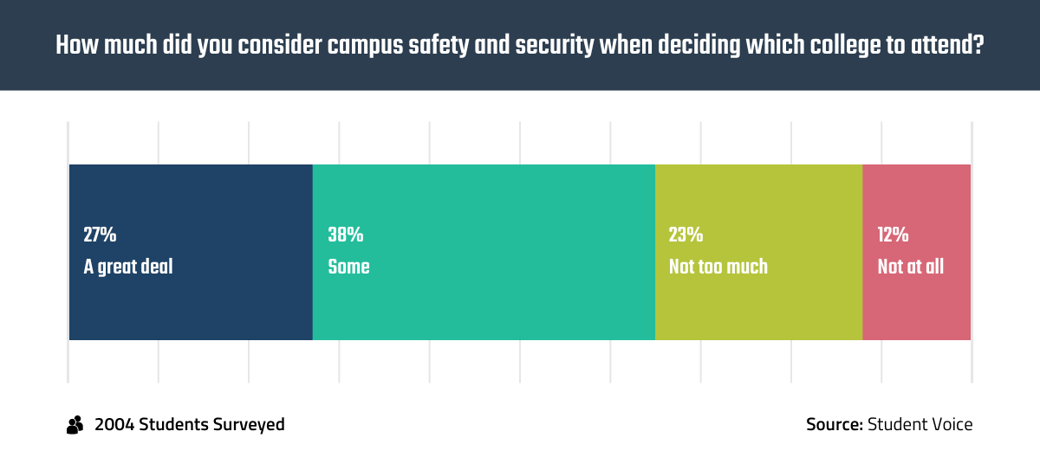What’s the most important criteria for choosing a college? Some students might say degree programs, cost, or location. Others might look at prestige, campus life, or sports. But regardless of differing priorities in these areas, most students agree that a safe campus is important. In a Student Voice survey, 38% of students said they considered campus security “some,” and 27% considered it “a great deal.”

For students to fully reap the advantages of a college education, they must feel safe. Based on Maslow’s hierarchy of needs, safety is a core necessity, second only to physiological commodities like air, water, food, and shelter. The constant anxiety resulting from unmet basic needs hinders students' development. As a campus leader, you can make security a priority with the following recommendations:
Determine What Security Measures Your Campus Is Missing
When students were asked what safety and security measures they’d want their campus to invest in, they chose things such as expanded mental health support to reduce incidents, increased police presence, more lighting, security cameras, and building access restrictions.
Their collective responses align with the best practice of a layered approach to security, which involves:
- Deterring crime
- Controlling access to various areas of campus
- Detecting potential security issues
- Identifying who’s involved in an incident or crime
Consider what layers are lacking in your security protocol. Have students or staff requested increased security or additional solutions? Are there specific areas of campus that are more prone to crime? Do you have aging security technology? Based on the answers to questions like these, determine what solutions you need to address any deficiencies.
Before implementing any new solutions, be sure they don’t add additional risks. For example, a prominent university in Washington, D.C., replaced physical keys with Bluetooth-activated locks students can unlock with their phones. The change was intended to enhance safety, reduce the hassle of lost keys, and cut costs. Instead, students are frequently locked out when the lock software glitches or the students’ phone batteries die. They’re concerned about their safety when they’re unable to access their dorms, especially at night. Having already invested in the technology, the university doesn’t have the budget to revert to traditional locks.
By implementing well-vetted solutions to fill any security gaps on your campus, students will feel more at ease.
Proper due diligence can help your institution avoid a similar scenario. By implementing well-vetted solutions to fill any security gaps on your campus, students will feel more at ease.
Foster Strong Relationships With Campus Law Enforcement
Building positive relationships with campus police helps build a culture of trust, accountability, and safety. But 57% of students say they’ve never had any interaction with campus police or security. This lack of engagement prevents students from feeling comfortable and supported in their daily lives on campus.
57% of students say they've never had any interaction with campus police or security.
By actively promoting opportunities for interaction, such as organizing meet-and-greet events, educational programs, or community forums, you can help bridge this gap and encourage meaningful connections between students and campus law enforcement. Through these initiatives, students can develop a sense of familiarity, feel more at ease reporting concerns, and develop a stronger sense of security within the campus community.
Ensuring law enforcement has the resources and technology they need to proactively address security concerns is important as well. Unfortunately, even police departments at large institutions don’t have budgets to scale — which brings us to our third recommendation.
Advocate for Security Funds
In March 2023, Samantha Steckloff, a Michigan State Representative and chair of the higher education budget subcommittee, advocated for a permanent fund to help colleges and universities enhance and maintain their campus security systems. Why? According to Steckloff, higher education institutions are forced to juggle students’ educational needs with the escalating costs of ensuring their safety. This struggle isn’t unique to Michigan — campuses nationwide are in similar situations.
As we mentioned before, security is a critical human need, and unsafe environments aren’t conducive to learning. Once you’ve identified a technology or service to help protect your campus, don’t immediately write it off if the numbers on paper don’t work at first glance. Seek creative solutions for funding. Here are a few ideas:
- Leasing — When investing in a hardware-based solution, such as electronic key control systems, ask your technology partner about leasing options. By approaching security as an operational expenditure rather than a capital expenditure, you might find it’s easier to meet your budget requirements.
- Phased Rollout — A phased rollout allows you to spread out your investment over time. Start with one department, one building, etc., and expand capacity as needed.
- Grants — Search for grant funding you can use toward security.
Working security into the budget can feel like an impossible task, but investing the time in making it work is worth it — especially if it means you’re able to strike a balance between educational enhancements and campus security.
Don’t let safety concerns be the reason students pass on your institution’s unique degree programs, beautiful campus, generous scholarship opportunities, or vibrant student life. Take steps to protect students, foster positive relationships with campus police, and secure the funds to actualize these initiatives.


